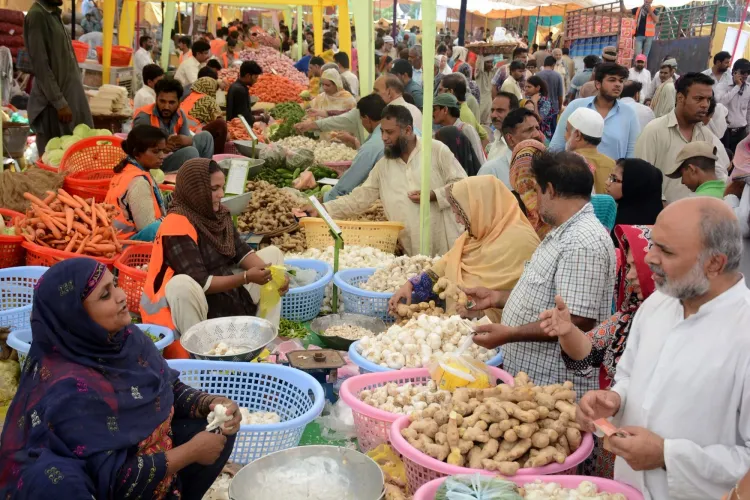How is Inflation Rising in Pakistan Due to Border Conflicts with Afghanistan?

Synopsis
Key Takeaways
- Inflation in Pakistan is driven by halted imports due to border tensions.
- Vegetable and fruit prices have reached record highs.
- Local crop failures have worsened food scarcity.
- The government is under pressure to manage rising costs.
- Geopolitical tensions are impacting economic stability.
Islamabad, Oct 30 (NationPress) Inflation in the markets of Rawalpindi and Islamabad has been escalating dramatically as the ongoing border conflicts with Afghanistan have disrupted the trade of essential goods, including vegetables and fruits, for the last two weeks, according to local media reports.
The prices of various vegetables and fruits have surged to unprecedented levels across Pakistan. Currently, tomatoes are priced at PKR 450 per kilogram, garlic at PKR 600, ginger at PKR 800, peas at PKR 400, onions at PKR 180, and radish at PKR 150 per kilogram, as reported by the leading daily, The Express Tribune. Additionally, Kandhari pomegranates have seen an increase to PKR 450 per kg, while grapes from Chaman are now priced over PKR 550 per kilogram.
Trade with Afghanistan, which typically supplies tomatoes, apples, grapes, pomegranates, and dried fruits, has come to a complete halt despite it being the peak season. Milk vendors have also announced an increase in prices for November. The situation has been exacerbated by local crop damages caused by recent floods, according to market insiders.
“Pakistan’s vegetable and fruit harvests have been devastated. We depended significantly on Afghan imports. Currently, supply is limited while demand is soaring. Prices won't decrease until trading resumes,” stated Ghulam Qadir Mir, President of the Anjuman Tajran Sabzi Mandi, as quoted by the newspaper.
Border crossings at Chaman, Khyber, South and North Waziristan, Kurram, Bab-e-Dosti, Torkham, Kharlachi, Angoor Adda, and Ghulam Khan have been closed for 14 days, leaving numerous containers stranded on both sides. Perishable goods, including fruits and vegetables, have spoiled in transit. Meanwhile, dairy sellers have reported that the price of milk per litre will rise from PKR 220 to PKR 240, and yogurt will increase from PKR 240 to PKR 260 per kilogram starting the first week of November.
On Wednesday, Pakistan's Defence Minister Khawaja Asif issued a strong warning to the Afghan Taliban, asserting that they can test Islamabad’s resolve at their “own peril and doom.” He emphasized that Pakistan would not need to deploy “a fraction” of its complete arsenal to “entirely obliterate” the Taliban and force them back into hiding, as reported by Geo News.
In a statement on X, the Defence Minister remarked, “We have tolerated your treachery and mockery for long enough, but no longer. Any terrorist attack inside Pakistan will result in a bitter consequence for you. Test our resolve and capabilities at your own risk.”
“Let me assure them that Pakistan does not need to use even a fraction of its full arsenal to completely eliminate the Taliban regime and return them to hiding. Should they wish so, witnessing their retreat akin to the Tora Bora incident would be a sight to behold for the regional populace,” he added.
This warning comes amidst heightened tensions following Pakistan’s cross-border military operations in Afghanistan and the failure of negotiations between the two nations’ delegations in Turkey on Monday.
On Tuesday, Afghanistan also issued a stern warning to Pakistan, pledging a strong retaliation against any future military actions after talks in Islamabad broke down due to Pakistan’s withdrawal. According to reports, Ariana News indicated that Pakistan exited the discussions after presenting what the Afghan delegation termed as “unreasonable and unacceptable” demands, including a call for Kabul to rein in armed individuals allegedly operating against Pakistan—a demand firmly rejected by the Afghan side. It was added that if Pakistan carries out airstrikes on Afghan territory, Afghan forces are prepared to respond to Islamabad.










